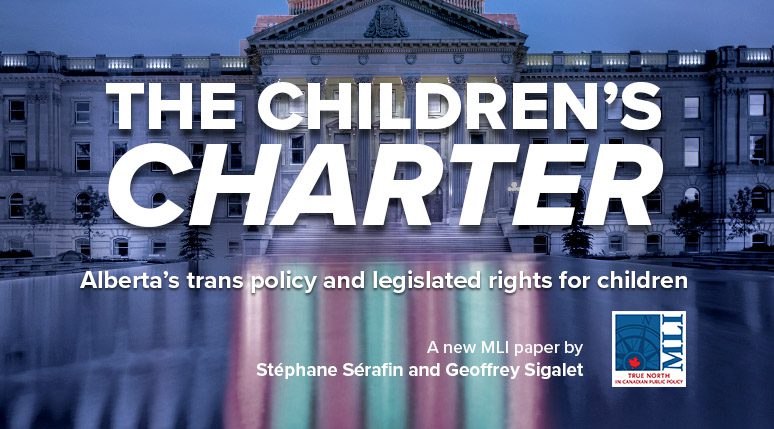By Stéphane Sérafin and Geoffrey Sigalet
June 4, 2024
Executive Summary
Alberta recently announced that it would follow New Brunswick and Saskatchewan by enacting policies requiring schools to notify and obtain consent from parents in order to change the names and pronouns of children under the age of 15. Alberta also set out plans to go further than Saskatchewan and New Brunswick by restricting the availability of medical interventions such as puberty blockers and cross-sex hormones to children under the age of 16 and sex reassignment surgeries to children under 18. It also proposed restrictions on the participation of biological males in female sports. The policy announcements have provoked a wave of one-sided criticism from academics, especially legal academics.
Of particular note, was the “Open Letter to Danielle Smith” signed by 36 Faculty members at the University of Alberta and University of Calgary faculties of law (Koshan et al. 2024). The letter openly attacks any limits on “gender affirming” interventions for children, including Alberta’s proposed ban on sex change surgeries, as a violation of Charter of Rights and Freedoms rights and mischaracterizes Canadian law by suggesting that parental rights are fictional or irrelevant. It also dismisses the empirically proven advantages of biological males in women’s sports as no different from “the significant advantages already allowed within women’s sports, such as the advantage tall women have when playing basketball.”
In this research article, we engage with the claims of this open letter, in addition to other reactions to the kinds of policies proposed by Alberta, Saskatchewan, and New Brunswick. Against these views, we argue that policies such as Alberta’s are best understood as protecting the rights of transgender-identifying children and their parents, as well as the rights of girls and adult women to meaningfully participate in athletic activity. We demonstrate how critics of Alberta’s proposals have mischaracterized the significant protections that the Charter offers to children, parents, and to women and girls in this policy context.
First, we note how much of the criticism of Alberta’s policies has failed to properly focus on the special vulnerabilities of children. We survey the myriad ways that Canadian law, including the Charter, offers special protections for children as the most vulnerable members of society.
Second, we argue that parental notification and consent policies are quite consistent with the special role Canadian law accords to parents and other caretakers as the agents best positioned to make decisions in the best interests of their own children. Those who dismiss or diminish the importance of parental rights are not only mischaracterizing positive law but also rejecting foundational liberal principles.
Third, we observe how age-related restrictions on children’s access to different products and activities are widespread and easily justified in Canadian law as being in the interest of protecting children. We also review growing evidence of the uncertain benefits and grave risks of “gender affirming” medical interventions such as puberty blockers or cross-sex hormones and argue that this evidence helps to justify Alberta’s age-based restrictions on such interventions.
Fourth, we review the special protections offered to women and girls in Canadian law, including sections 15 and 28 of the Charter, and how Alberta’s proposed restrictions on biological males participating in women’s and girls’ sports are simply part of the exclusivity necessary to make these sports fair and substantively equal. The advantages possessed by biological males, even after medical interventions, are empirically clear and significant such that prohibiting them from participating in female sports serves the non-discriminatory purpose of protecting women and girls against arbitrary and unfair sporting events.
In the final sections of the paper, we note that any invocation by Alberta of section 33 of the Charter (the notwithstanding clause), following Saskatchewan’s example to protect its policies from substantive judicial review, is best understood as anticipating disagreement with federally appointed courts about how Charter rights relate to this policy context. Laws invoking section 33 can protect rights and other communal interests. We also argue that claims about how Alberta’s policies violate “Indigenous legal orders” should be made with much more caution considering the colonial history of denying Indigenous parents rights over their children’s upbringing.
Read the full paper here:







